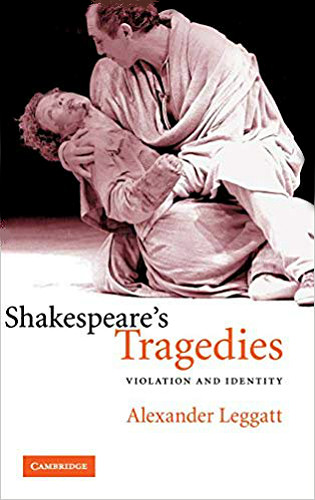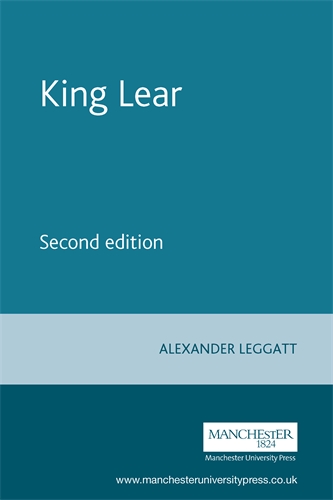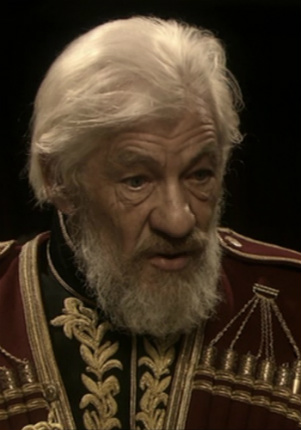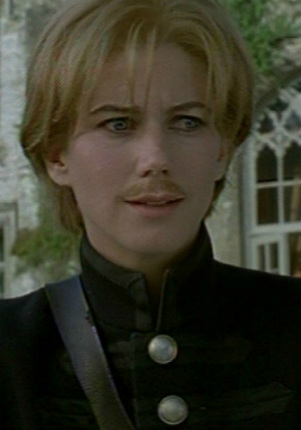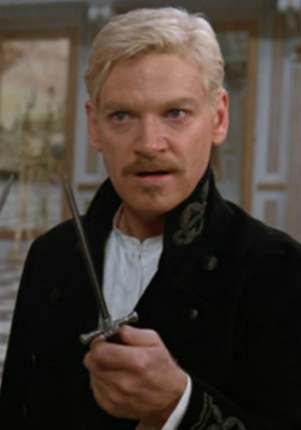King Lear
FROM ‘MARA, MARIETTA’
Part Ten Chapter 10
Weaving and unweaving their watery motifs, the waves roll in to reproach me: I have not fought hard enough, I have been too acquiescent. Fight? For the Kingdom of Love? If she is Lear, am I Cordelia…
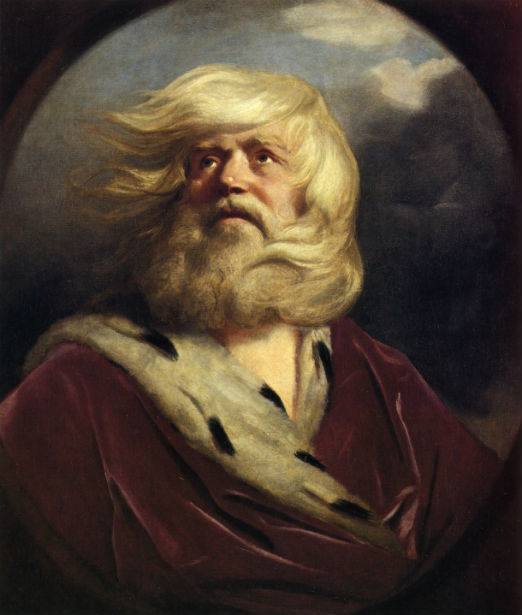
Joshua Reynolds, Study for King Lear, c.1760
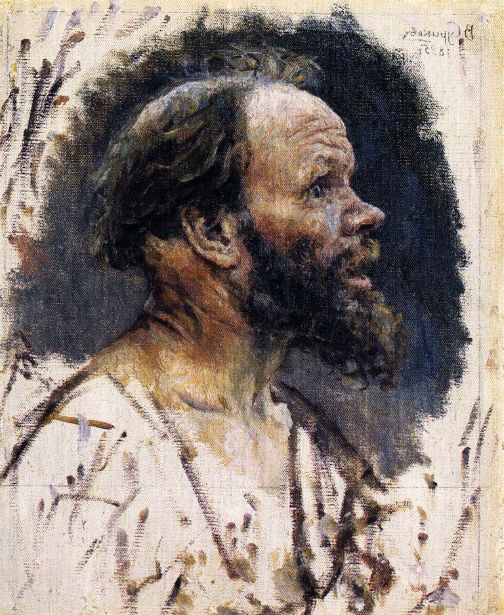
Vasili Ivanovich Surikov, Head of a Fool, 1885
…if I am Lear, she is the Fool. I cannot keep her: She keeps her word.
LEAR AND CORDELIA
Alexander Leggatt
All images from Trevor Nunn’s film of King Lear, 2008.
From Alexander Leggatt, Shakespeare’s Tragedies: Violation and Identity (Cambridge University Press, 2005). Edited for the sake of concision.
I – UNMAKING CORDELIA
In the first scene of King Lear, Cordelia’s father tries to annihilate her. He does this most obviously in the curse he utters when he banishes her, an attack that leaves no mark on her body but aims at destroying her humanity, her relationships and her identity. Lear has defined Cordelia as his daughter, and if she is not his daughter she is nothing. Cordelia’s ordeal is compressed into the first scene, after which she disappears for a long time as though Lear has truly annihilated her. Lear’s attack on Cordelia means that he is the one who breaks apart. From the self-violation of Lear’s identity, chaos spreads through his family and his kingdom, as identities and the structures of relationship that depend on them break down.
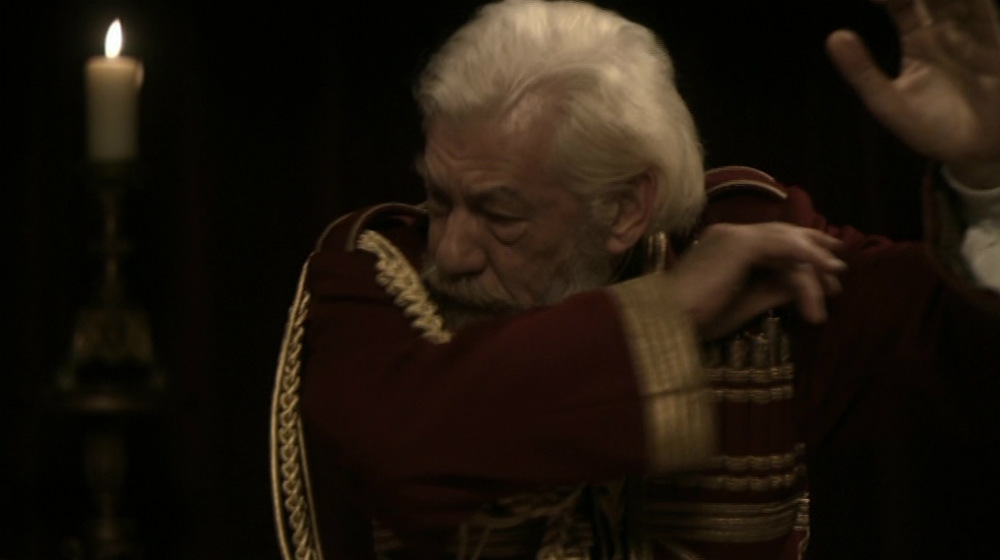
Ian McKellen as Lear
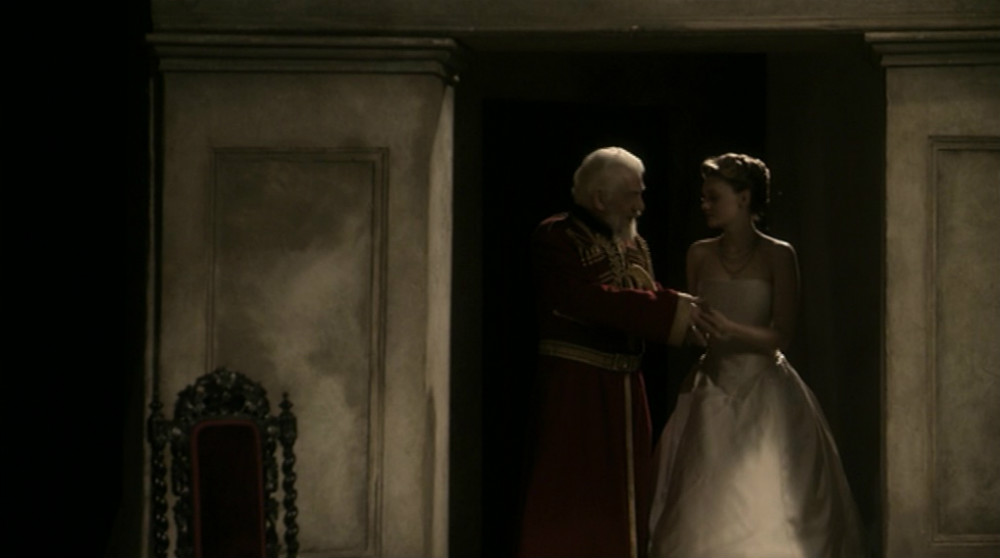
King Lear with Romola Garai as Cordelia
The annihilation of Cordelia and ultimately of Lear is implicit in the love-test. Chaos starts, as it so often does, with an attempt to impose order. Lear has at the beginning a clear image of Cordelia. She is the daughter who loves him best, who will make the best speech, who will get the biggest share of the kingdom and the privilege of his company for the rest of his life. But this fantasy, no less than the curse, annihilates Cordelia herself. It allows her no space for her own decisions, her own needs, her own life. From the start, she is not real to Lear; he has constructed a version of her in his mind. Lear’s fantasy is that Cordelia loves him totally. In the service of that fantasy he constructs a rigged, artificial love-test in which Cordelia’s victory is foreordained. The phrasing of his question, ‘Which of you shall we say doth love us most’ makes the issue depend on his own judgment. He has already made that judgment, and expects them to confirm it. He has imagined how they will speak, putting words in their mouths, Cordelia’s in particular. What looks like a free experiment has a determined end; an act of surrender is an act of control.
The unreality of the occasion is reflected in the vagueness of its language. Goneril offers a love expressed in large generalities, ‘Beyond what can be valued, rich or rare’. Regan offers the same, only more so. Lear in turn divides a map that has no distinguishing features, each section of the country being equally lush, ‘With shadowy forests and with champaigns riched, with plenteous rivers and wide-skirted meads’. We cannot relate this to any known geography, or tell where the divisions fall. The kingdom, like the love, is idealized to the point of unreality. Lear’s fantasy deals in absolutes, and breaks against the reality of the woman on whom it centers. Yet the truth Cordelia proclaims is full of paradoxes. Her refusal to speak registers as a silence, anticipating her final, terrible silence at the end of the play. In Lear and Cordelia we see a father desperately trying to get speech from a silent daughter—except that Lear has silenced Cordelia himself by demanding a speech she cannot give. Cordelia says ‘Nothing’. She is not just tongue-tied; she says, quite articulately, that she is tongue-tied. She actually speaks far more than her sisters.
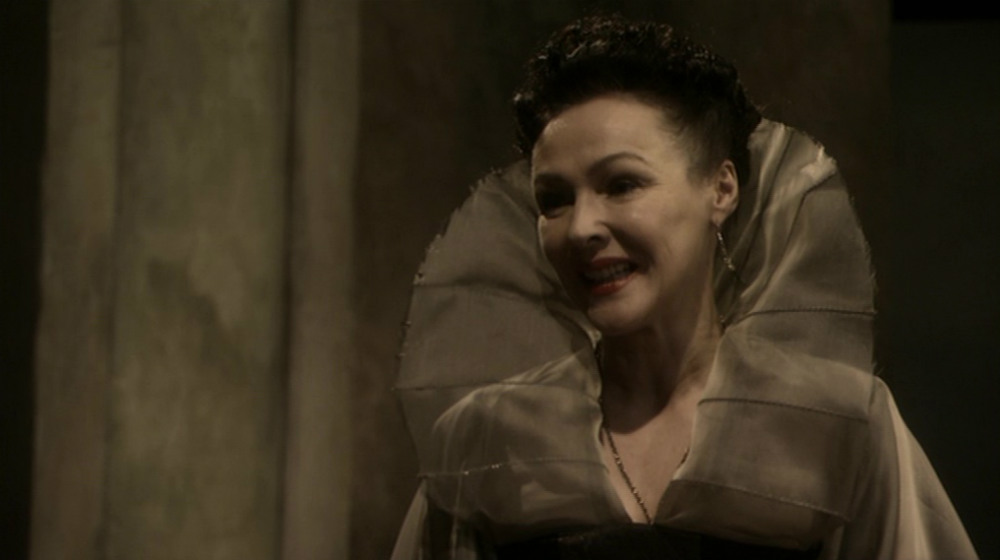
Frances Barber as Goneril
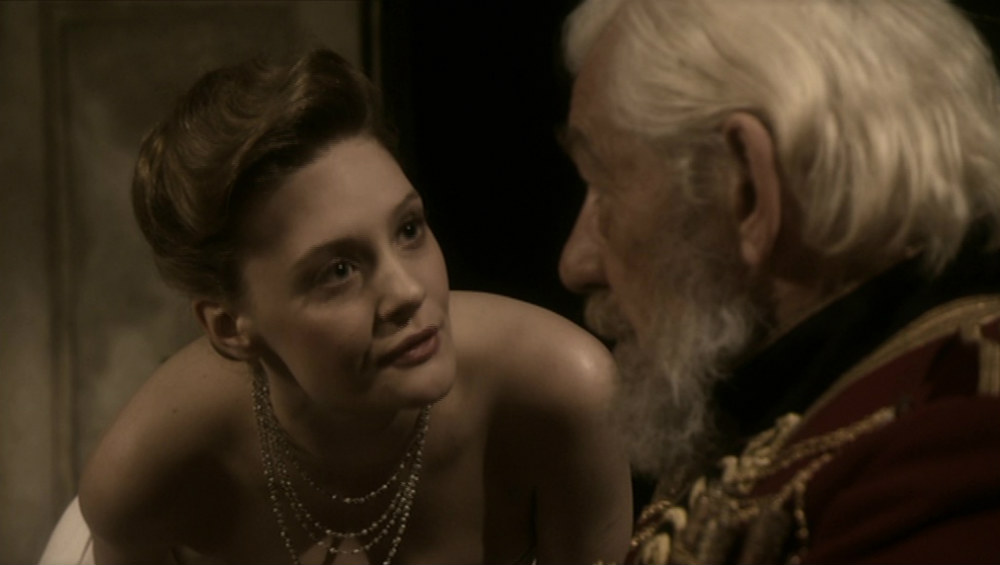
Cordelia and King Lear
While the language of her father and sisters has been vague, Cordelia’s is concrete. She makes her difficulty sound physical: ‘my love’s more ponderous than my tongue’; ‘I cannot heave my heart into my mouth’. When Goneril claimed ‘A love that makes breath poor and speech unable’ the easy flow of the lines belied her claim. Cordelia conveys the sheer weight of her love, pressing down on her tongue and keeping her heart from rising. When she speaks of heaving her heart into her mouth, she makes speech seem a violent internal disruption, as though her love could be spoken only at terrible cost. And so we get a limited version of it, duty responding to nurture. What is held back is the love that appears later in the play, breaking the pattern of exchange by meeting genuine injuries with a grace that refuses to acknowledge them (‘No cause, no cause’) and costing Cordelia nothing less than her life. The language of bargaining Lear has established in the opening scene is so inadequate to this fuller love that to speak it now would be a betrayal; it has to wait until language can contain it. Meanwhile Cordelia falls in line with what language is doing now, speaking of love as a matter of exchange and insisting on keeping it realistic: ‘You have begot me, bred me, loved me. I return those duties back as are right fit, obey you, love you, and most honour you.’ This at least touches on actions rather than vague feelings, and unlike her sisters, who talk airily about their love, Cordelia draws on a history of shared life.
One sense in which the speech of Cordelia reads as silence: It registers as such on Lear, because she is not saying what he wants to hear. And so he takes her sensible, measured profession of love as a flat refusal of it. If she is not giving him what he wants, she is giving him nothing. What he wants is everything. Goneril and Regan claim to offer total, unqualified love, and Lear expects no less from Cordelia. Instead she asks,
Why have my sisters husbands, if they say
They love you all ? Haply when I shall wed,
That lord whose hand must take my plight shall carry
Half my love with him, half my care and duty.
She falls again into the language of measurement and exchange Lear himself has set up: if the kingdom is divisible, so is her love. If love is quantifiable, then there is only so much to go around. Again Cordelia draws on reality: while her own marriage is still in the offing, Cornwall and Albany, just by being there, make her point that women sometimes have husbands.
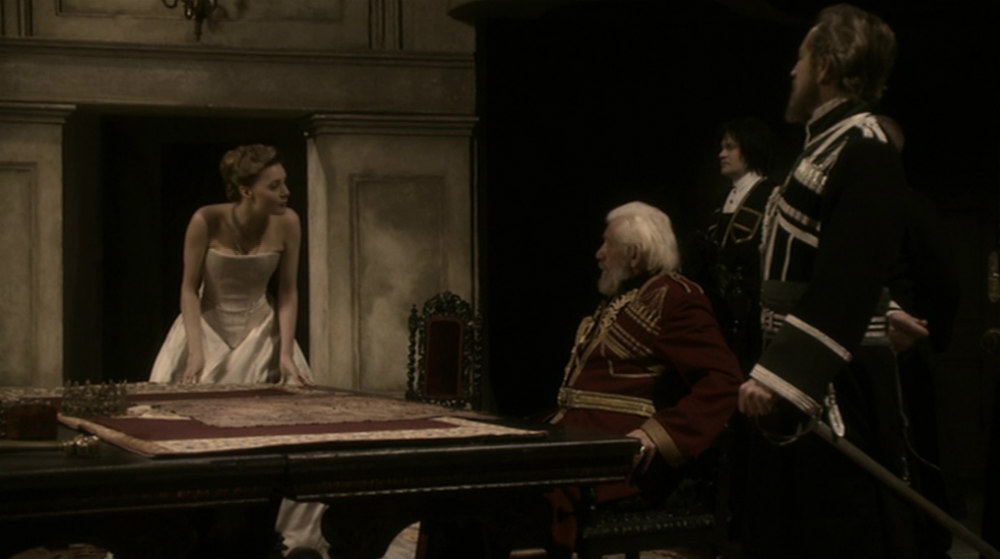
Cordelia and Kong Lear
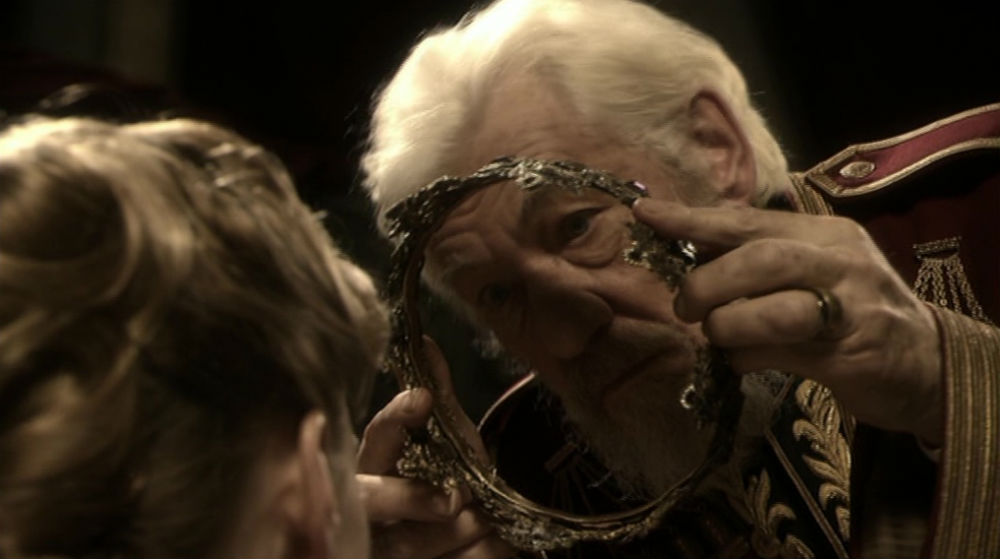
Cordelia and King Lear
What Lear had in mind is revealed when he complains, ‘I loved her most, and thought to set my rest on her kind nursery’. While Cordelia is ready to move forward to marriage as the next stage of her life, Lear wants a regression and an inversion: he will be the child and she will be his nurse, even his mother. There seems no place for a husband in this picture. Arguably, what he really wants is a marriage with Cordelia, with the love-test functioning as the bride’s promise to her husband. Later there will be a hint of sexual rivalry in Lear’s bitter reference to ‘the hot-blooded France’. In the unguarded speech of madness he tells the attendants who have come to take him to his daughter, ‘I will die bravely, like a smug bridegroom’. If Cordelia senses this as an undercurrent in the opening scene, no wonder her response is silence followed by a carefully measured account of what a daughter owes a father. Incest blurs identities and suggestions of incest hover over the love-test, blurring Lear’s relationship with Cordelia. These suggestions create not so much a subtext of literal incest as a metaphor for an evil that pervades all Lear’s relationships, his insistence on making absolute demands. In particular, Lear is asking for pledges that would nullify those required by the wedding ceremony, and that is just Cordelia’s point. On what is supposed to be the day of her betrothal Lear seems bent on making her marriage impossible.
The opening dialogue of Antony and Cleopatra playfully rewrites the opening of King Lear, with Cleopatra asking ‘If it be love indeed, tell me how much’ and countering Antony’s claim that his love is beyond reckoning, ‘I’ll set a bourn how far to be beloved’. Lear cannot set a bourn; for him it is all or nothing, and when Cordelia will not give him everything he tries to annihilate her. Unable to accept a love divided between himself and her husband, he declares, ‘Thou hast her, France; let her be thine, for we have no such daughter’. Cordelia professed to love Lear ‘according to my bond’. He tears up that bond: ‘Here I disclaim all my paternal care, propinquity and property of blood’. She has claimed, ‘You have begot me, bred me’; he denies it. Having created her, he uncreates her, swearing ‘By all the operation of the orbs from whom we do exist and cease to be’. Lear trying to uncreate Cordelia.
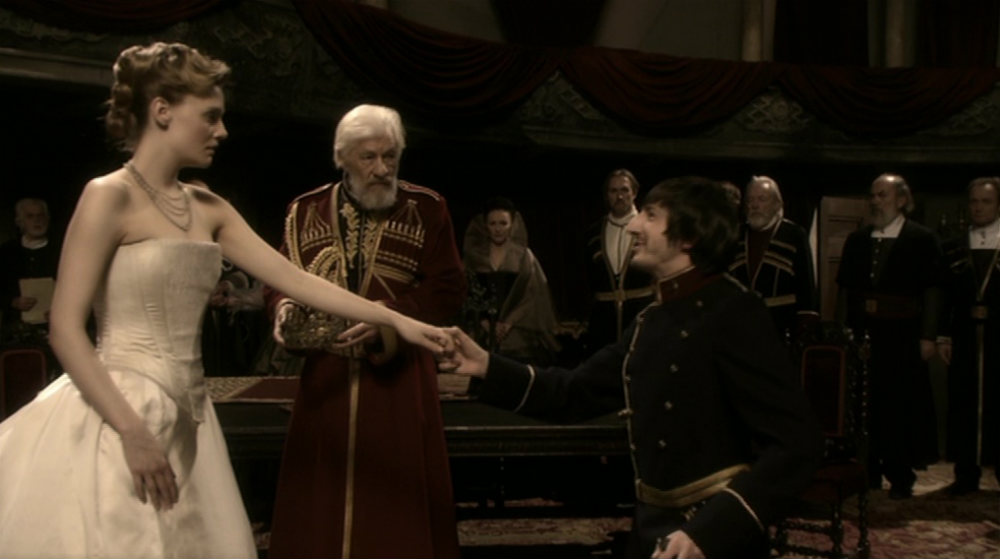
Cordelia, King Lear, and Ben Addis as the King of France
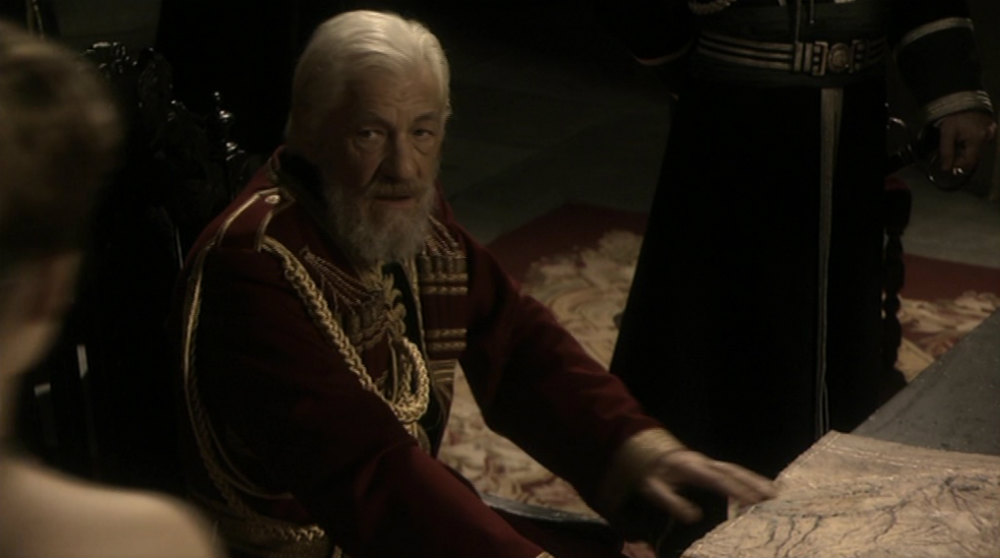
Cordelia and King Lear
He tries not just to annihilate her but to put her into a parody relationship with himself, conveyed in negative language: ‘Unfriended, new adopted to our hate, dowered with our curse and strangered with our oath’. He violates his relationship with her by violating the language of relationship. In a similar way he tries to blight her marriage: ‘Thy truth then be thy dower’ (for France, it will be); ‘Let pride, which she calls plainness, marry her’. The unnaturalness Lear sees in Cordelia reflects his own unnaturalness:
The barbarous Scythian,
Or he that makes his generation messes
To gorge his appetite, shall to my bosom
Be as well neighboured, pitied and relieved,
As thou my sometime daughter.
In his total, life-denying demands, he himself is the cannibal father who eats his own child. Lear’s attempt to unmake Cordelia seems a complete reversal of his view of her at the beginning of the scene, but it is also an expression of it. At the beginning he saw her as a source of total love and protection, all directed at him; in her own person she was nothing. When she asserts her own reality, and he counterattacks by reducing her to nothing, this simply brings to the surface what he was doing to her all along. Nothing has come of nothing.
II – UNMAKING LEAR
As Gloucester rewards the unknown man who is helping him—‘Here, take this purse’—Lear rewards the man who, kneeling and kissing his hand, has acknowledged his kingship: ‘If thou wilt weep my fortunes, take my eyes.’ Lear’s self-preoccupation is typical, but it is followed by a breakthrough of simple recognition: ‘I know thee well enough, thy name is Gloucester’. Gloucester has already recognized Lear as he cannot recognize Edgar: ‘I know that voice’; ‘Is’t not the King?’. He sets up the fuller restoration of identity that Cordelia offers. She reverses the damage her sisters have done. They denied Lear his hundred knights; Cordelia’s command, ‘a century send forth’, symbolically restores them. And she restores Lear’s titles : ‘How does my royal lord? How fares your majesty?’.
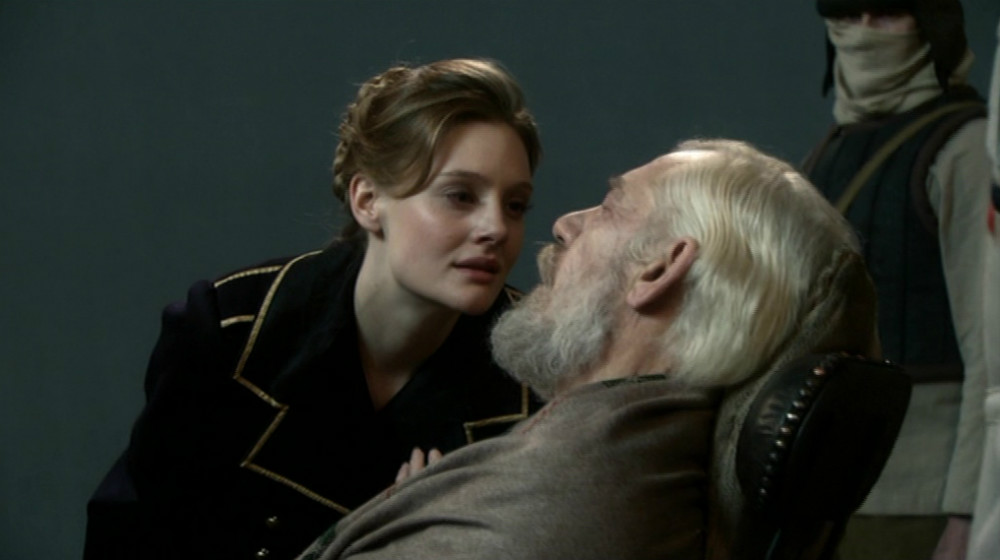
Cordelia and King Lear
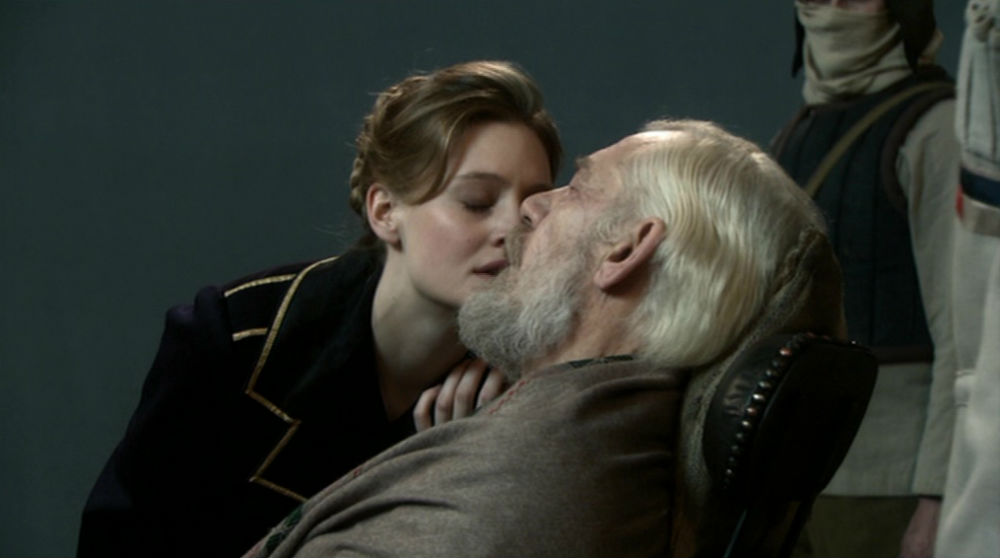
Cordelia and King Lear
As he sleeps she kisses him:
O my dear father, restoration hang
Thy medicine on my lips, and let this kiss
Repair those violent harms that my two sisters
Have in thy reverence made.
After all the assaults on the body, verbal and literal, the relief of this moment is such that she seems to be healing not just her father but the whole play. Cordelia wipes out the real offense Lear has done her. Prepared to drink poison from her hands, Lear compares her with her sisters, ‘You have some cause, they had not,’ and Cordelia replies, ‘No cause, no cause’.
When her attendants come for Lear, he runs away. As in the ambiguous political situation, so in Lear’s deranged mind, Cordelia’s mission seems like enemy action. He cannot face her, and she has some trouble facing him. When he wakes, Cordelia is at first reluctant to speak to him, asking the Gentleman to do it for her. It may be that, remembering what happened the last time she spoke to Lear, she is afraid of her own words. Lear’s first response to his restoration is ‘You do me wrong to take me out o’the grave’. Though he is never, like Gloucester, overtly suicidal, he has earlier seen the grave as a place of shelter and protection, swearing as he banishes Cordelia, ‘So be my grave my peace’. Lear’s first waking thought is that his return to life is a violation; it is grave-robbing seen from the viewpoint of the dead.
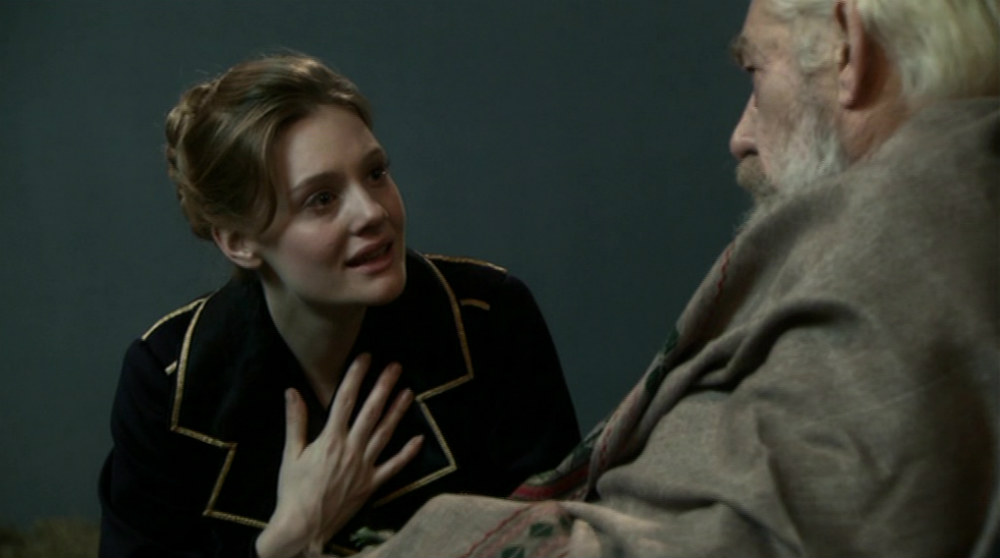
Cordelia and King Lear
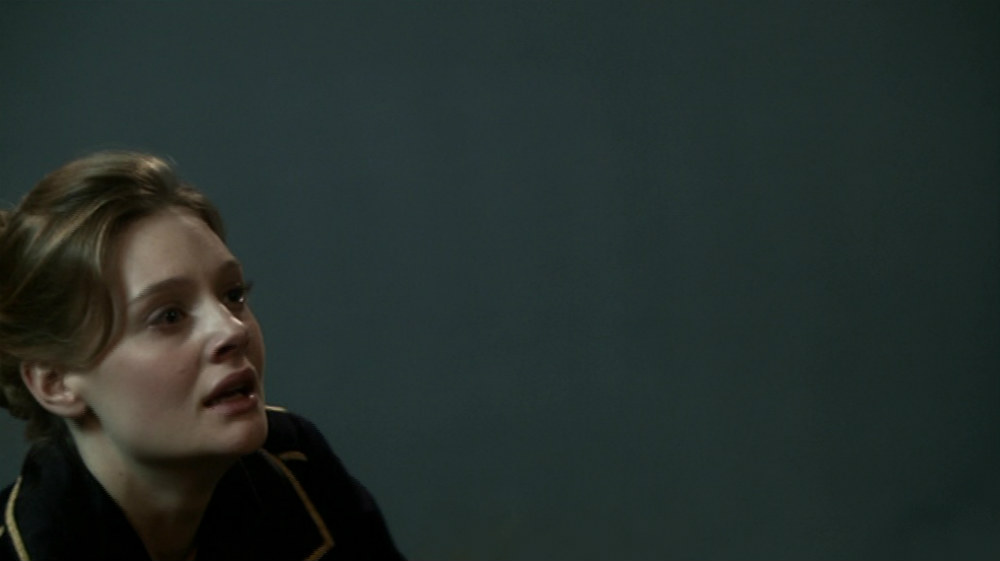
Cordelia
In this new life he feels helpless and vulnerable: ‘Pray do not mock me. I am a very foolish, fond old man’. He sees himself as Goneril and Regan did, and when told he is in his own kingdom replies ‘Do not abuse me’. Their view of him offered a comfort like that of the grave, the comfort of giving up and accepting that his life was over. Now he is forced to begin again, and he tries to retreat, as he ran from Cordelia’s soldiers. In these moments of withdrawal, neither wants human ties restored; neither wants life to go on. Lear puts at first the greatest imaginable distance between himself and Cordelia, the distance between heaven and hell:
Thou art a soul in bliss, but I am bound
Upon a wheel of fire that mine own tears
Do scald like molten lead.
After what he has wanted from her, and done to her, just to look at her is a punishment. There may also be a memory of Lear’s fear and loathing at having a daughter’s flesh mingled with his; he now tries for the most radical separation he can imagine. He is saying, again, ‘We have no such daughter.’ He turns from her to consider himself, and finds he cannot get himself in focus:
I should ev’en die with pity
To see another thus. I know not what to say.
I will not swear these are my hands: let’s see –
I feel this pinprick. Would I were assured
Of my condition.
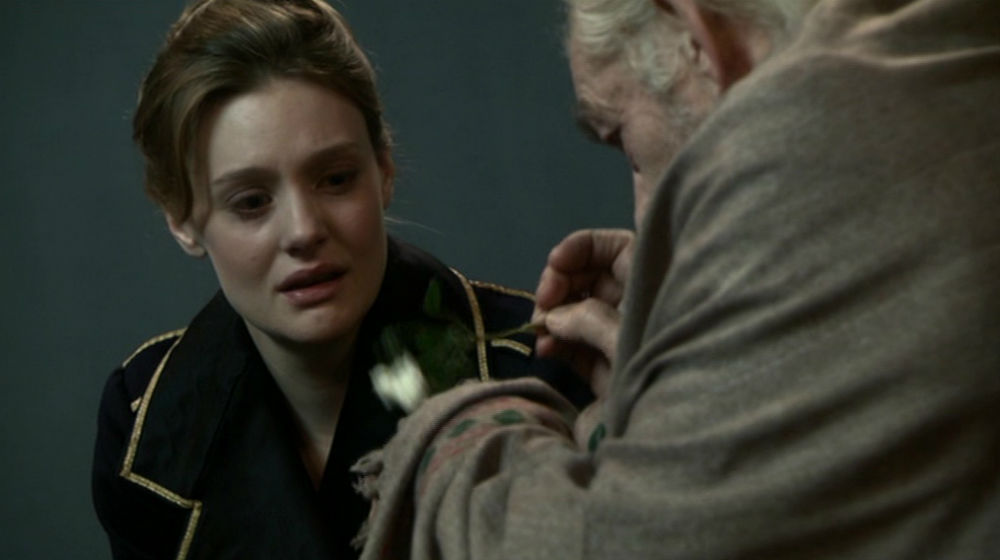
Cordelia and King Lear
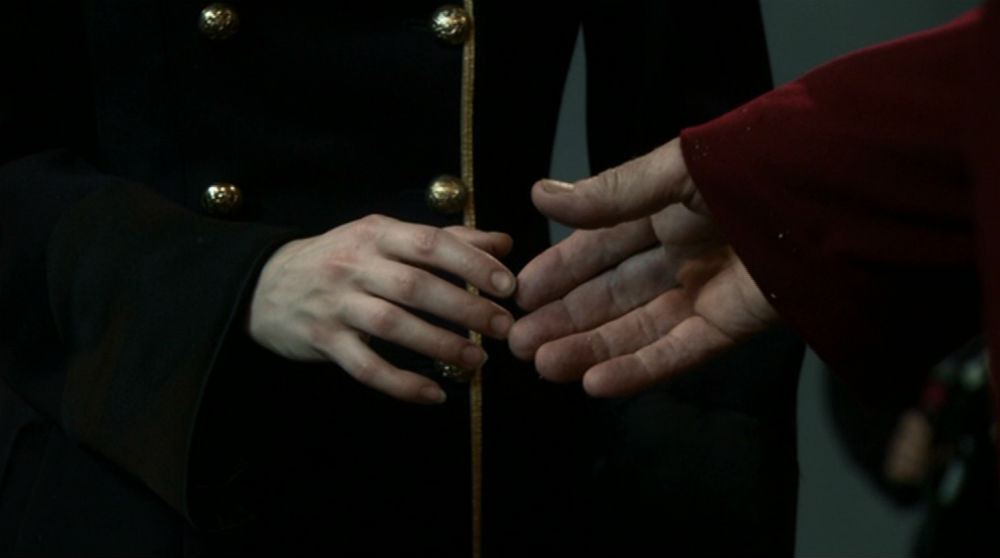
Cordelia and King Lear
In earlier scenes his pity for other people was bound up with pity for himself. Now to understand what he feels about himself he has to begin by imagining another person. The person remains hypothetical and Lear retreats, baffled, language itself failing him. Turning to his body as a sign of his physical reality, he feels detached from it, not sure this is really him. The taking of hands established relationship for Romeo and Juliet, Edgar and Gloucester; looking at his own hands, Lear feels disconnected from them. As in kneeling to Cordelia he is doing with perfect seriousness what he did ironically when he knelt to Regan, he is now taking his early, sarcastic ‘this is not Lear’ and wondering if it is the simple truth. Even what should in this play be the ultimate test of reality—he can feel pain—does not convince him.
From this point he never again speaks his own name. The recognition he gropes towards and achieves, undoing the curse he uttered in the first scene, is ‘I think this lady to be my child Cordelia’. Though he feels disoriented by his own body, he tests reality by touching hers: ‘Be your tears wet? Yes, faith’. Earlier she has asked him ‘hold your hands in benediction o’er me!’ with an implied assurance that those are indeed his hands; he kneels instead and she pleads with him not to. The gestures that imply hierarchy, his authority over her, and the inversion of that in her authority over him, are both refused. The gesture that brings them together is his touch on her face. Lear tried to unmake Cordelia. Confronted with her again he tries not only to retreat but to unmake himself. All the things that defined him, and that others, over his protests, tried to take away—kingship, authority, his own name—he now tries to surrender. It is as though violation and the loss of identity, so pervasive in this play as Lear’s attempt to annihilate Cordelia recoils on himself and leads to chaos in his kingdom, have returned now as instruments of grace. Lear being forced out of his grave, denied the peace of death, is given a new life; losing his identity has freed him from the solipsism and egotism that blocked his full engagement with the world.
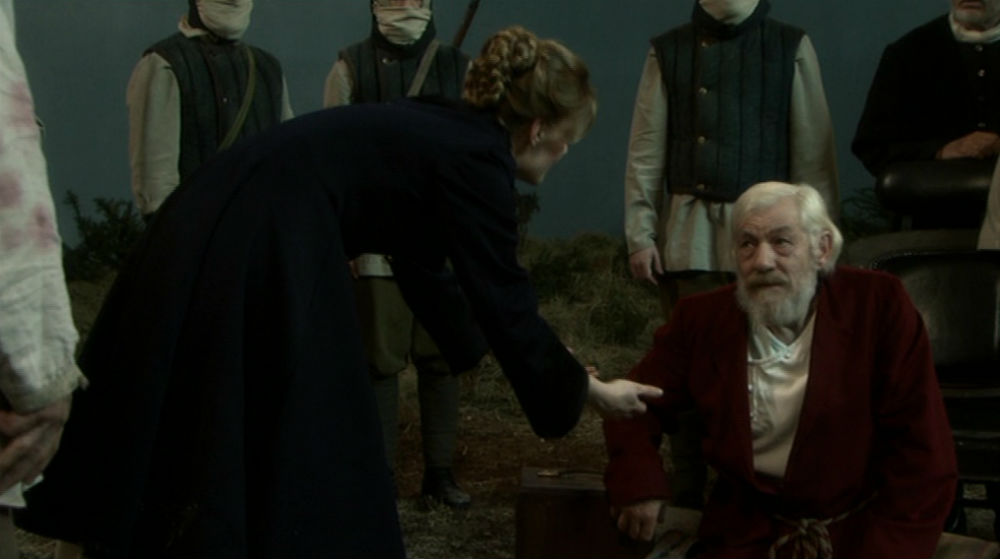
Cordelia and King Lear
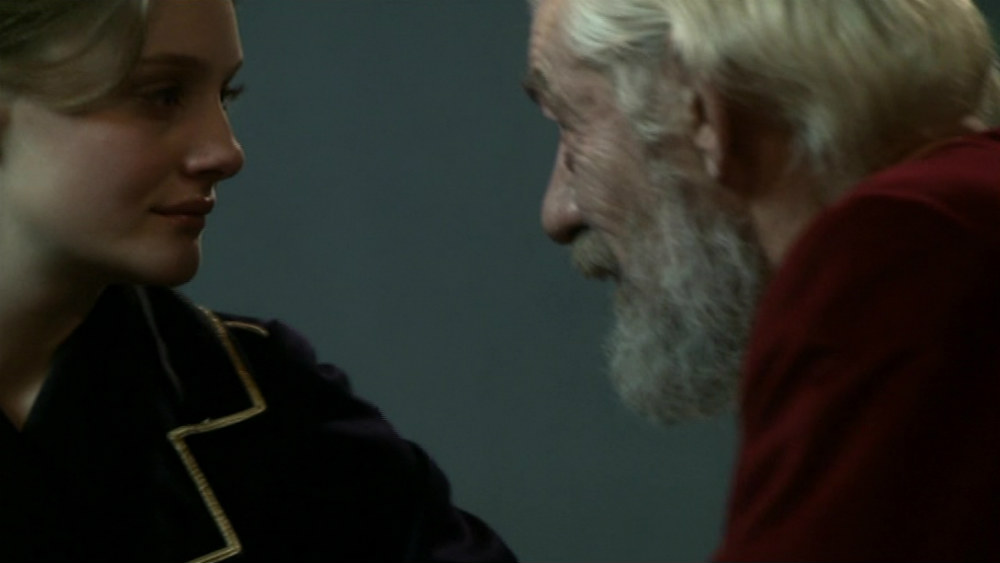
Cordelia and King Lear
The very instruments that did such damage in the first scene have undone that damage. Yet the opening of King Lear returns to disturb the Lear–Cordelia reunion, troubling its beauty. This reunion is Lear’s original fantasy come true. Cordelia is looking after him, and her husband has vanished. In the Quarto the King of France lands briefly in Britain and then returns; in the Folio he is simply not there. Is this one reason why Lear comes to accept his happiness so slowly? Either it is too good to be true, or he realizes what was unnatural in that fantasy and no longer wants it, is even afraid of it. His question ‘Am I in France?’ acknowledges Cordelia’s marriage as she herself does not. Either he is afraid the dream is incomplete, or he is showing that he is willing to accept Cordelia’s new life. Perhaps he is trying to ground this new experience in reality, as Cordelia in the first scene tried to ground love in reality. The pain of ‘Do not abuse me’ on being told he is still in Britain suggests the question was asked in hope, not fear. He would find Cordelia’s nursing easier to take if her husband were there, freeing him from the taint of total possession of his daughter. With France not there, the best he can do is ask Cordelia to ‘forget and forgive’.
The Lear–Cordelia reunion is shot through with memories of the old trouble it tries to resolve. This makes it difficult, for Lear especially; but it also makes it moving and convincing simply because it is difficult. When he responds to their defeat and capture by imagining a new life for them together, Lear seems to have forgotten the difficulty. There is a new confidence, a fierce possessiveness, in his cry,
Have I caught thee? [Embraces her.]
He that parts us shall bring a brand from heaven,
And fire us hence like foxes.
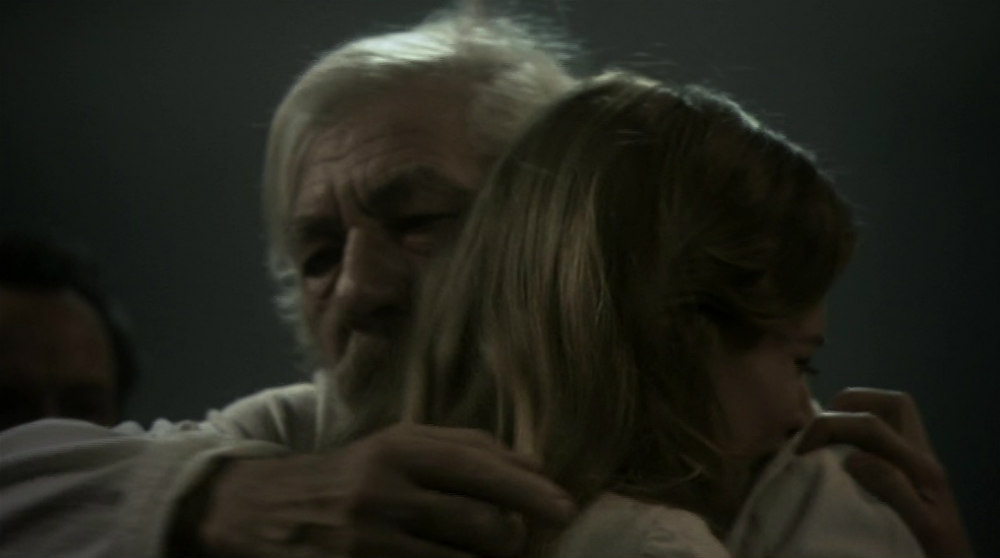
King Lear and Cordelia
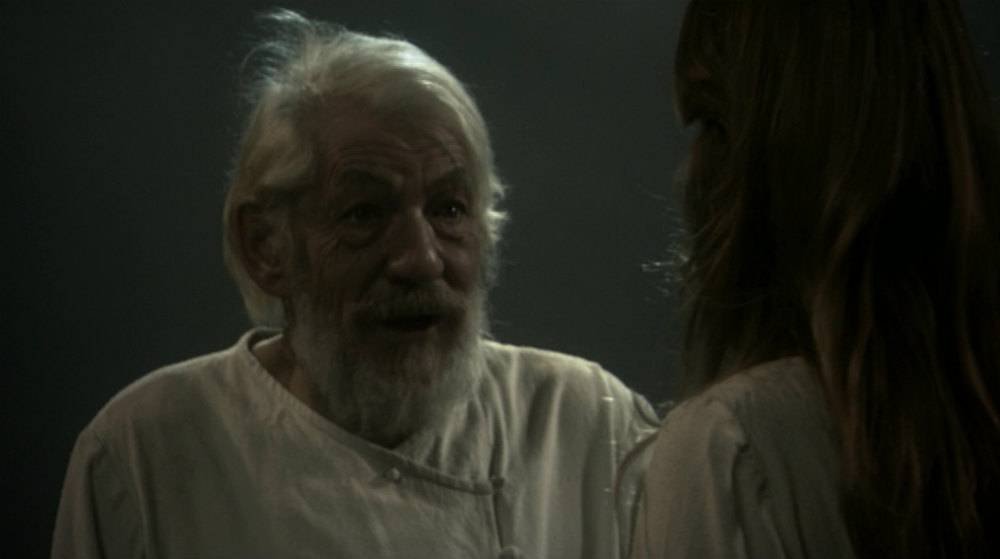
King Lear and Cordelia
That only some force from heaven can part them suggests he thinks of this as a marriage. He fantasizes that in prison they will have a happy, playful life together, just the two of them, looking with amused detachment at the world. The difficulty of their reunion, in which Lear acknowledged her separateness and was shy about claiming anything from her, was a saving difficulty. His confidence restored and his inhibitions gone, he is regressing to something like the unnatural demands of the first scene, though his manner has changed from overbearing authority to easy self-assurance. Once again he needs Cordelia to bring him back to reality. She tries in one line, the last words we hear her speak: ‘Shall we not see these daughters and these sisters?’. As she did when she reminded him of her husband, she is trying to make him think of other people, other relationships. She knows the political reality of their situation, she is prepared to confront their enemies, and given the context there is intelligent irony in the words ‘daughters’ and ‘sisters’. He brushes all this aside in favor of his own view of a happy ending. But the play has shown that relationships are at their fullest when they acknowledge trouble; and we are on the brink of a series of endings—the doing of justice, the re-tying of severed bonds, the recovery of identity—in which the trouble will be overwhelming.
King Lear has an unsettled ending. The trouble Lear began when he severed his bond with Cordelia has never quite been dispelled; it returns in his attempt to construct a fantasy life with her, an attempt that takes us back to the first scene. As Lear’s initial violation of Cordelia sent shock waves through the rest of the play, his reversion to his old way of thinking precedes what may be the most troubled ending in Shakespeare. Lear and Cordelia seem at first withdrawn from that ending; there is so much business to do that does not concern them. But they withdraw only to return with devastating force. The chaos of the play began with them, and returns to them.
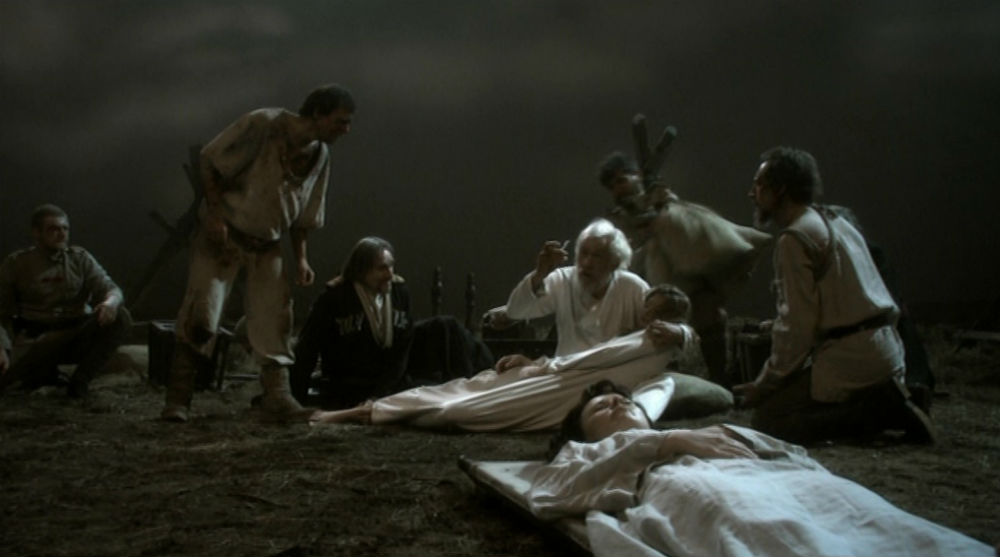
King Lear
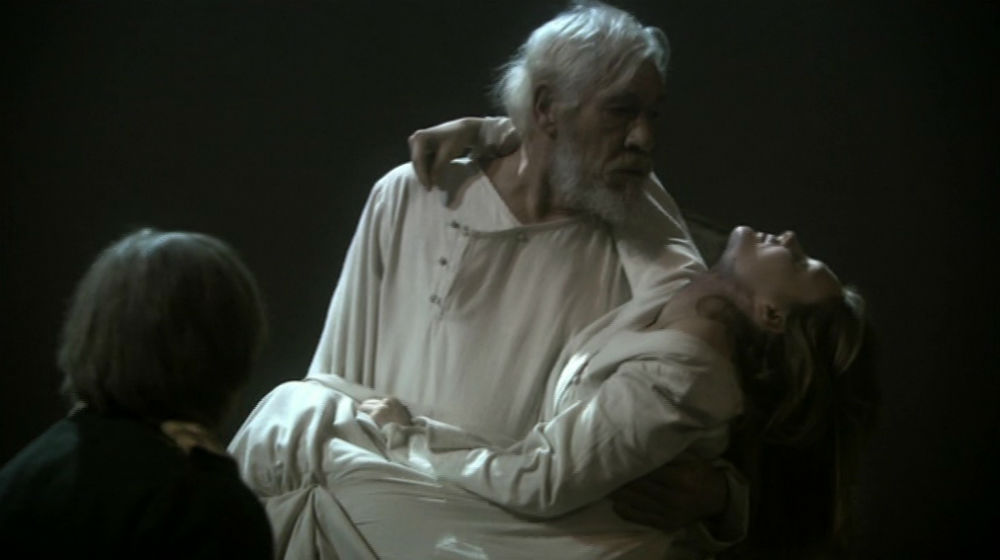
King Lear and Cordelia
III – TROUBLED RESOLUTIONS
In his reunion with Cordelia, Lear’s original fantasy of being nursed by her came true. That was succeeded in the first scene by another fantasy: he wanted her annihilated. That fantasy in turn comes true: ‘we have no such daughter’ is now a terrible reality. The end of Lear’s relationship with Cordelia is haunted by the way it began, yet the annihilation of Cordelia produces her closest relationship with her father. Lear wanted to crawl unburdened towards death. Now he comes onstage carrying the burden of Cordelia’s body. Physically, it is the closest relationship they have had. Her body is the dominant presence in the scene, the thing we have to look at whether we can face it or not. In her first scene she alternated speech and silence; now her silence is more eloquent than speech. Lear wanted her to nurse him. Now he is nursing her, tending her, trying to bring her out of the grave. He caresses her name: ‘Cordelia, Cordelia, stay a little’. Here, language is a stark confrontation with the thing itself : ‘Never, never, never, never, never’. Such relief as Lear finds comes from an occasional wavering of his attention as other, shadowy figures temporarily distract him, and, just once, the dead Cordelia seems to become someone else: ‘And my poor fool is hanged’.
Lear’s intense concentration on Cordelia’s lips may suggest the final claim of love, the claim he has never quite learned to withdraw. But more immediately what he wants is words, even breath. We hear one side of a dialogue with the dead: ‘Cordelia, Cordelia, stay a little. Ha? What is’t thou sayst?’; ‘I killed the slave that was a-hanging thee’. In his imagination she moves back and forth across the final threshold: ‘This feather stirs, she lives’; ‘now she’s gone for ever’. As we found an empathy with Gloucester, being told to look at things we could not see, we may feel an empathy with Lear’s desperate hope. The original stage directions for Lear’s entrance specify that he is carrying Cordelia, not that she is dead; for all we can tell she could be still alive. But in Shakespeare there are links between mirroring and death, and when Lear cries, ‘Lend me a looking-glass; if that her breath will mist or stain the stone, why then she lives’, he is looking for signs of life in images of death: a mirror, a stone.
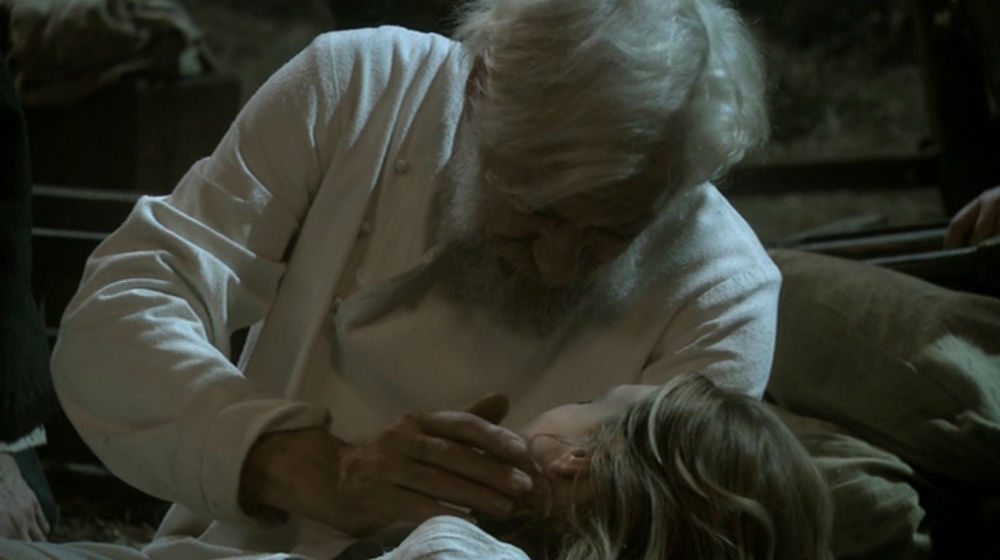
King Lear and Cordelia
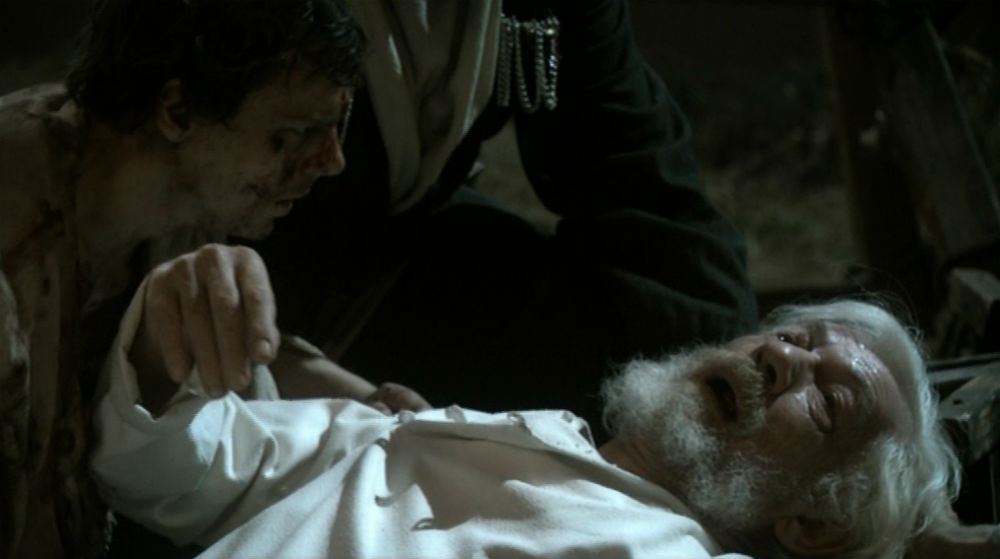
Ben Meyjes as Edgar, with King Lear
In the Quarto Lear virtually kills himself with a last attack on his own body: ‘Break, heart, I prithee break’. Those are his last words; language kills. In the Folio that line is given to Kent and Lear dies with an intense concentration on Cordelia’s body: ‘Look on her: look, her lips; look there, look there!’. Here we (and Lear’s imagined hearers, whoever they are) are told, as we have been told all through the play, to look. In the Quarto language kills; here, sight kills, drawing on the intensity of the relationship that is concentrated in Lear’s final gaze. Throughout the last scene he has been unable to focus that gaze properly on anyone else: ‘Who are you? Mine eyes are not o’the best, I’ll tell you straight’; ‘This is a dull sight: are you not Kent?’. His fantasy of a private world to share with Cordelia alone, in which no one else matters, has in a terrible way come true. Edgar’s command, ‘Look up, my lord’ would draw his gaze away from Cordelia; it falls on dead ears, and draws Kent’s rebuke: ‘Vex not his ghost; O, let him pass’. Kent knows that Lear’s concentration on Cordelia is killing him, and he knows that Lear should die. In the Quarto, where language kills, Albany says of Lear, ‘He knows not what he sees’; sight has emptied out. In the Folio, where sight kills, the line is ‘He knows not what he says’. Language has emptied out.
Lear’s love for Cordelia begins as an unregulated, self-centered demand and ends as an attempt to drag her back across the threshold of death. He began by trying to deny the reality of Cordelia’s life; he ends by trying to deny the reality of her death. He has asked for more than life, and death, can offer. He is punished for demanding love and punished for loving, not by any regulating gods but by the conditions of life itself, the separateness of one person from another, the finality of death.
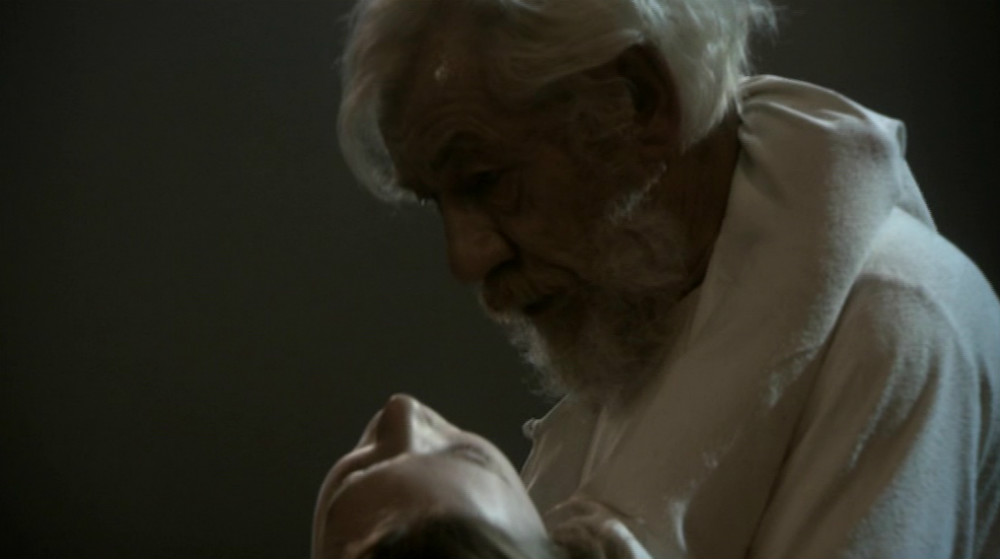
King Lear and Cordelia
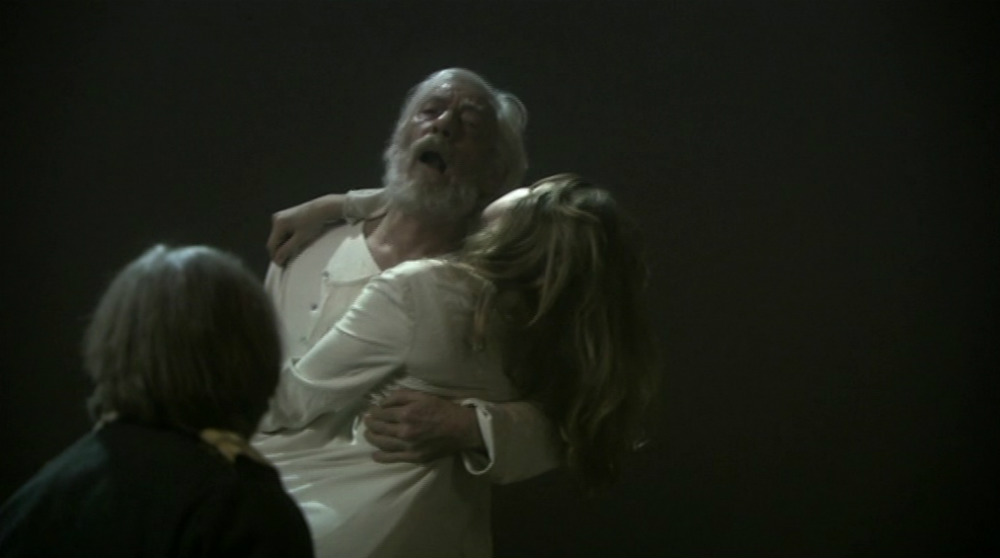
King Lear and Cordelia
The brutal power of King Lear has always seemed to center on the death of Cordelia—its shocking unexpectedness, its lack of justice. Yet this ending is latent in the play from the beginning. Lear’s initial act of violation is his attempt to unmake Cordelia’s identity, the result of which is the unmaking of his own. Lear tries to resist the loss of his identity when that loss stems from attacks on him by Goneril and Regan. Yet when Cordelia tries to give his identity back, he refuses to take it. Touched with healing—music, fresh garments, a restoring kiss—he reacts as though he is being tortured, bound upon a wheel of fire.
To take identity away is violation; but to give it back is also violation. And when he eventually accepts the new life Cordelia has to offer, Lear sets up the conditions for his final agony, in which his initial curse comes true, and kills him by killing her. It was in relationship that he had hoped for happiness; it is relationship that kills him. To say that life is our punishment for being born is not, for this play, just a large generalization. King Lear shows death latent in birth, as the wheel comes full circle when Lear enters carrying a dead body as though it were a newborn child. The play sees violation not just in Lear’s attack on Cordelia, but in the restoration of identity and relationship that seems to counter that attack. In King Lear, hurt and healing are so twisted together that they cannot be separated.
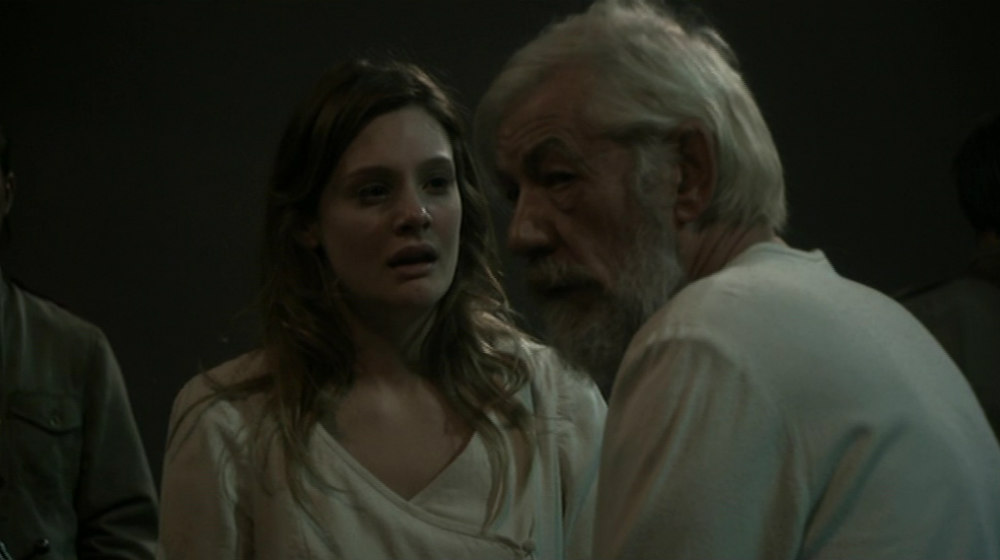
Cordelia and King Lear

